Subtotal: $
Checkout-

At the Welcome Table II
-

Love Is Work
-

How Shall We Farm?
-

Why Yemen Starves
-

Digging Deeper: Issue 20
-

Cloth and Cup
-

Level
-

Editors’ Picks Issue 20
-

The Necessity of Reverence
-

A Book to End All Walls
-

Edna Lewis
-

The Dead Breed Beauty
-

Table Fellowship
-

Covering the Cover: The Welcome Table
-

Restoring a Creek
-

What I Stand For Is What I Stand On
-

Feasting in Kurdistan
-

The Birthday Party at the End of the World
-

From Farm to Feast
-

Readers Respond: Issue 20
-

Family and Friends: Issue 20
-

Streams in the Desert
-

The Boy and the Bull
-

This Is My Body
-

The Greatest Thing Since Sliced Bread
-

The Ground of Hospitality
-

Beating the Big Dry
-

Cows and Elephants

Breaking bread around the world: Plough asked five friends in five places to share what hospitality looks and tastes like. Read part two here.
Already a subscriber? Sign in
Try 3 months of unlimited access. Start your FREE TRIAL today. Cancel anytime.
First Meal
Cozine A. Welch Jr.
Madison Heights, Michigan
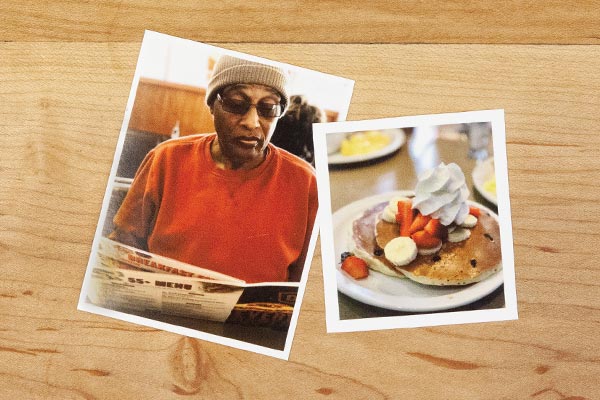
“The more colorful the meal, the better for you” is the adage. So I order my blueberry pancakes with bright red strawberries and sunshine bananas topped with whipped cream. My father does the same, sans cream, strawberries, and bananas. I’m clearly the health-conscious one.
It’s little over an hour since my release from a twenty-year sentence for a crime I committed at seventeen. My father and I sit opposite each other on stiff maroon cushions in a booth at Bob Evans. We had been farther apart from each other in view and disposition when we’d eaten here in the nineties. The 240 months of suffering and growth since then have partly bridged the gulf.
The mood, as we sit here at my first meal, late morning sunshine glinting off our spotted silverware, is a strange mix of joy and sadness. Missing from this reunion is my mother. Sixty-eight days before my release, two days after the fifteen minute phone call in which I told her I’d be coming home, she died. Oddly, we don’t feel incomplete. It’s as if we both can see her there, in her usual spot, eating her colorful omelet, green bell peppers poking through canary yellow eggs.
Leaving the prison, my father’s radio played: “I’ll always love my mama. She’s my favorite girl.” It’s still in my head as we sit here, thankful and mournful; laughing, then silent. We look to the empty space where her wheelchair would have been and smile through watery eyes.
Cozine A. Welch Jr. is a published poet, editor, and teacher at the University of Michigan in Ann Arbor.
Tableside Rescue
Norann Voll
Elsmore, Australia
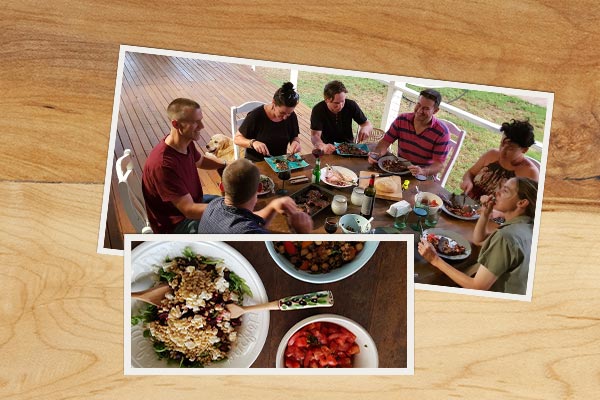
Here in Australia, spontaneous gathering is a comfort in times of drought, fire, and floods – and a far better use for a veranda than solitary sky-gazing, trying to anticipate the weather. And when, as is local custom, everyone brings a bit of the feast with them, the creativity multiplies.
Recently, my family faced a week that held one tough anniversary, two phone calls with very bad news about loved ones, daily nearby bushfires, and not a drop of rain. Friends around the table performed the rescue. …
And so I find myself in the colorful mayhem of a country kitchen, alongside two other country mamas. Here the dishes create themselves, including a roast pumpkin and beetroot salad with pine nuts and feta. We cube and oven-roast the peeled beets, and discover the pumpkin has gone moldy. No worries – we throw in some arugula instead. I choose this moment to share my bad news. The sympathy hugs are genuine. The pine nuts toast in the skillet, and there’s laughter. Crushed garlic, balsamic vinegar, olive oil, and the juice of a whole fresh orange are whisked into a dressing with salt and pepper. Once the beets are tender, everything gets layered, the dressing added, and finally the feta is crumbled – sharp and snowy – on top. Bread bakes. We pour wine and move outdoors, where our men are eager to start the barbeque.
We follow the food and conversation to the table, to partake as family, and to be nourished, blessed, and restored by it all.
Norann Voll is a writer living in Danthonia, a Bruderhof community in New South Wales, Australia.
Island Festival
Jairo Condega Morales
Ometepe, Nicaragua
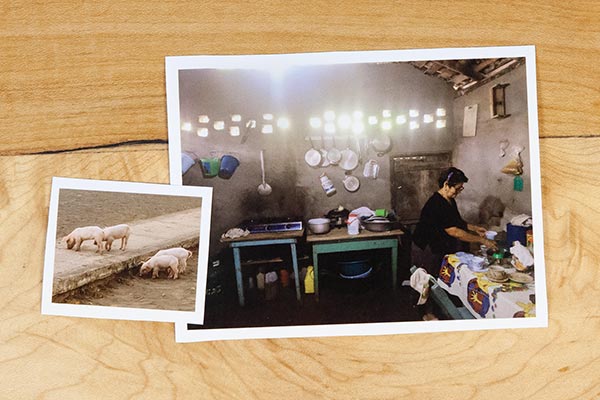
This past December, families from the Catholic parish of San Jose del Sur, a village of nine hundred on the small volcanic island of Ometepe, celebrated Christmas differently. We gave a feast for seventy-two schoolchildren, many of whom regularly go hungry. There was a piñata, gifts, games, dancing, and generous helpings of pork – the Ometepe pigs, which roam freely around the island, provide a flavorful and nutritious meat.
“Ometepe, oasis of peace,” runs a much-quoted song in praise of my native island in Lake Nicaragua. For centuries, Ometepe has lived up to its nickname. Even during Nicaragua’s great bloodlettings – first the Sandinista revolution, then the Contra insurgency – there was no fighting on the island’s soil.
That changed in the second half of 2018, as police and government-aligned paramilitaries have cracked down on protestors in the aftermath of popular protests. There have been shootings, beatings, and arrests. As a result of the repression, Ometepe’s economy, which depended heavily on European ecotourists, has tanked, with hotels, restaurants, and mountain guide firms now shuttered. Many of the thirty-five thousand islanders – traditionally small farmers, like my own parents – find themselves without income for medicine and necessities. Among children, malnutrition is on the rise.
That’s why our family and others wanted to express our love for the children of our village – they are the most vulnerable ones.
At the end of a hard year, this feast was a moment of shared happiness – for the children, and for us.
Jairo Condega Morales is an Ometepe native who coordinates Plough’s El Arado program of free books and educational programs for schools in Nicaragua.
The Warm Table
Seonghee Kim
Seoul, South Korea
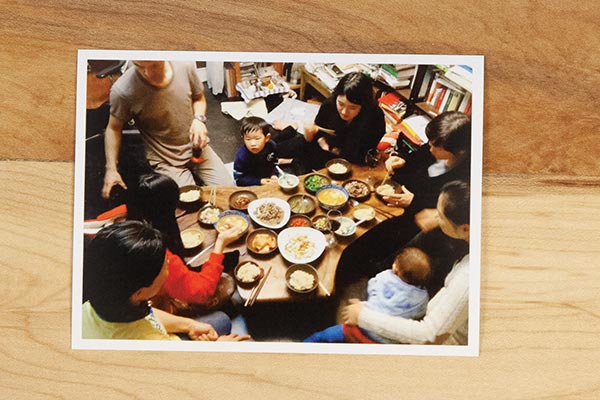
We sit around the table with my wife’s brother’s family, and their mother. It’s shortly after we moved to Seoul from the house we had built in the countryside. The food is not particularly festive; the table is a zelkova board that I cut from a discarded tree trunk.
We share multigrain rice, kimchi, namul muchim (seasoned vegetables), bulgogi (seasoned beef barbeque), and doenjang-jjigae (fermented bean paste stew) – our typical daily menu. Knees and chopsticks bump into each other; our living room is small, and many people sit around the table. My wife holds the baby so her sister-in-law can eat.
It isn’t just family members who sit around this table. We often have friends, classmates, and colleagues come to our house to share meals. In our parent’s generation, serving a good meal to travelers was a part of life. It has become rare to see such gatherings. Incomes have increased dramatically in Korea, but the room in our hearts and schedules has decreased. I see our society traveling a rich but lonely way. But the memory of our parents who served meals to such a variety of people reminds us: we know the meaning of “the warm table.” And it is that which we are trying to carry on. A meal is not just made of individuals. It becomes a living body that warms the participants, encouraging them and giving them strength.
Seonghee Kim works for Hansalim, a cooperative movement in South Korea that connects farmers and consumers to “save all living things.”
Mulled Cider in Manhattan
Leah Libresco
New York, New York
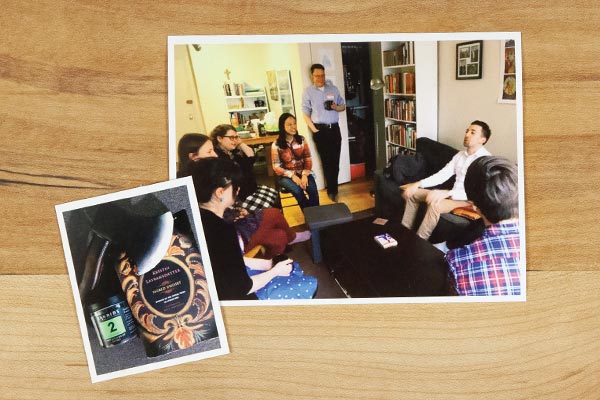
Despite the suggestion of one of my guests, I did not whittle pegs and stake fish over an open fire for our party, even if Kristin might have. In January, friends (and friends of friends of friends) came over to celebrate the end of our five-month journey through the one thousand pages of Kristin Lavransdatter. Sigrid Undset’s epic can feel intimidating, so we made a Facebook group and vowed to stick it out to the (spoiler!) plaguey end.
Our discussion as we read had been lively, but all online, so my husband and I invited anyone who could make it to our home on the Upper West Side of Manhattan when the read was over, for some in-person discussion. We were pleasantly surprised by how far people were willing to come. Folks crossed the river from New Jersey, took the train up from D.C., and one couple took a flight from Ohio. We welcomed them all with mulled cider – and a bottle of bourbon for added warmth.
Some of the people in our studio apartment were old friends, others were strangers, but all, as they introduced themselves, took a bite of the salty Norwegian licorice I’d bought for the party. “I can’t believe this book club has hazing!” someone complained. Two attendees ran to the kitchen to spit it out, and one woman went back for seconds, then thirds. Happily, one of the guests – taking her inspiration from the first volume of Kristin, “The Wreath” – had brought a Bundt cake.
Leah Libresco Sargeant is the author of Arriving at Amen and Building the Benedict Option: A Guide to Gathering Two or Three Together in His Name.
Already a subscriber? Sign in
Try 3 months of unlimited access. Start your FREE TRIAL today. Cancel anytime.





































